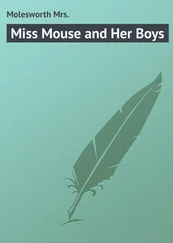Mrs. Molesworth - Lettice
Здесь есть возможность читать онлайн «Mrs. Molesworth - Lettice» — ознакомительный отрывок электронной книги совершенно бесплатно, а после прочтения отрывка купить полную версию. В некоторых случаях можно слушать аудио, скачать через торрент в формате fb2 и присутствует краткое содержание. Жанр: foreign_prose, на английском языке. Описание произведения, (предисловие) а так же отзывы посетителей доступны на портале библиотеки ЛибКат.
- Название:Lettice
- Автор:
- Жанр:
- Год:неизвестен
- ISBN:нет данных
- Рейтинг книги:3 / 5. Голосов: 1
-
Избранное:Добавить в избранное
- Отзывы:
-
Ваша оценка:
- 60
- 1
- 2
- 3
- 4
- 5
Lettice: краткое содержание, описание и аннотация
Предлагаем к чтению аннотацию, описание, краткое содержание или предисловие (зависит от того, что написал сам автор книги «Lettice»). Если вы не нашли необходимую информацию о книге — напишите в комментариях, мы постараемся отыскать её.
Lettice — читать онлайн ознакомительный отрывок
Ниже представлен текст книги, разбитый по страницам. Система сохранения места последней прочитанной страницы, позволяет с удобством читать онлайн бесплатно книгу «Lettice», без необходимости каждый раз заново искать на чём Вы остановились. Поставьте закладку, и сможете в любой момент перейти на страницу, на которой закончили чтение.
Интервал:
Закладка:
Mr Auriol paused and looked round him. All the three young faces expressed strong feeling. On Lettice’s there was a look of tension painful to see. Her lips moved as if she would have asked her cousin to go on, but no sound came. He understood her, however, and pitying her heartily, he continued, his eyes fixed on the paper before him.
“That help came from your father’s stepbrother, the only son of his father by his second marriage – the merchant, Mr Ingram Morison.”
There was a dead silence. The tears were in Nina’s eyes, and Arthur’s face was quivering, but Lettice’s was deadly pale and stony. And when she spoke her voice was so unlike itself that all started.
“Did my mother know this?” she said in a tone which matched the look on her face.
“Not at first,” said Mr Auriol, still avoiding to turn his eyes in her direction; “not till things were all in order would Mr Morison allow her to be told anything. He risked very large sums – of course, not so large to him as to a less wealthy man, but still actually large – to save your fortune. And, thanks to his great acuteness and experience, he succeeded most wonderfully, so that at the present time you do not actually owe him money .”
“Thank Heaven for that,” murmured Lettice.
Mr Auriol turned upon her with a sharp movement of indignation. But when he went on speaking it was as if continuing his words, and not as if addressing himself to her in particular.
“But you do owe him, what to a generous mind is never a painful burden, an immense debt of gratitude.”
“Then I recall my words,” burst out Lettice. “I wish to Heaven it were money, that I could work for it – work my fingers to the bone, till I could repay every farthing. To owe gratitude, that can not be counted in money, to that man! Oh, it is too much! How dared you do it?” she flashed out to Godfrey. “How dared you let him interfere?”
“You would rather have had your mother reduced to beggary – you would rather have had her last days tortured by anxiety for all of you? She did not resent it; she, who had far more right than any of you to be influenced by the old quarrel, with which Ingram Morison, remember, had no more to do than I had. She was not ashamed to be grateful and to show her trust and confidence in him, as you will see, when at last she knew a great part, though not the whole, of the truth.”
“And why did she not tell me, then? Oh, mamma, mamma,” wailed Lettice, forgetful of or indifferent to her cousin’s presence, “why did you not tell me? I thought I had your whole confidence, and to find this out now !”
She shook with sobs, and Godfrey’s face softened.
“Lettice,” he said, calling her for the first time by her name – though none of them, himself included, noticed that he did so – “my poor child, try to be reasonable. Your mother did not intentionally deceive you. It was only very lately she knew about it. Ingram Morison acted with the greatest delicacy – exaggerated delicacy, he wanted no one to know what he had done, and even at the last I could only persuade him to let me tell her part of it. She meant to tell it to you – gradually, knowing your strong feelings about it. She wrote so to me. I have the letter. But evidently she had not time to do so, or she may have found it more difficult than she expected.” And, as he again paused, there rose before Lettice the remembrance of the morning when her gentle, almost timid mother, had tried to lead to the subject of the Morison relations, of her softened feelings towards them, and how she, Lettice, had repulsed the attempt with decision almost approaching violence, and had afterwards said to Nina that she thought bodily weakness must be affecting her mother’s judgment. And then, at the last, it had been, or had seemed , as it so often does, so sudden. There had been no time or strength for more than a whispered blessing before the smile of perfect peace with which she closed her eyes on this world, had lighted up the loved, worn features, and she had breathed her gentle soul away.
Lettice sobbed still, but more softly now; and Mr Auriol went on.
“Had she lived, she would, I know, have wished to know the whole, and wished you all to know it too. And I too confess to some personal feeling in the matter. I too have some family pride. Your mother was my cousin – of the same blood. I could not bear that so great a service should be unrecognised. And, before coming here, I told Mr Morison that, unless he would consent to my stating the facts to you, and having no mystery or concealment about it, I would try to throw up the whole.”
“And then?” said Arthur.
“Then,” said Mr Auriol slowly, “if you all – though, no, I will not insult you by supposing such a thing – but if you all retained this terrible prejudice against an innocent man, things would be still worse, for he would be your only guardian.”
Another blow for Lettice.
“Our guardian!” exclaimed Nina in surprise.
“Yes. By your father’s will your mother and I were your guardians, and while she lived that part of it was merely nominal for me. But she had the power to appoint another in case of her death. And she did so. She appointed – ”
“ Him ?” exclaimed Nina.
“Yes. Your uncle, or step-uncle, if you prefer to be quite exact – Mr Ingram Morison,” Godfrey replied simply.
Then, without waiting for further remarks, he went on to explain, as clearly as was possible to such inexperienced ears, a number of business details – summing up by giving them a clear idea of what money they were sure of; of some which still remained uncertain, and by making them most distinctly recognise that, but for their uncle’s “interference,” the post of trustee of their possessions would indeed, long before this, have been a sinecure.
“And now,” he said, “there remains only one more duty before we talk about less painful and overwhelming subjects. I have here your mother’s last letter to me, sending me her will, which she wished me to look over, as I did, and going on to express her last wishes. Shall I read it to you, or shall I leave it for you to read alone?”
“Read it now,” said Lettice, rather to her brother’s and sister’s surprise. For they did not hear the words which she whispered to herself: “Better drink the cup of bitterness to the dregs, and have it over.”
So Mr Auriol read the letter aloud.
It was a simply expressed but thoughtfully considered letter, with no word or allusion to distress or wound any of her children. She spoke of her intention to explain to them these facts which had so recently come to her knowledge, but that before doing so she would wish to know more – the whole, in fact – that her words might have the more weight in overcoming the prejudice which, to a certain extent, she blamed herself for having, if not encouraged, at least not opposed. “My husband,” she said, “resented his family’s behaviour for my sake. I have a right to do anything I choose towards breaking down the barrier, of which I fear I was in great measure the unwilling cause. And he, had he lived to know his brother as I now know him, would have felt with me in this. For, though he was hasty and impulsive, he was, when he would allow himself to see things clearly, essentially just. And how can any one blame Ingram Morison for events which took place when he was a mere child?” Then she went on to beg Godfrey to convey to her brother-in-law her deep sense of gratitude for what she already knew, and her hope that he would accept the guardianship, which no one else would be so fitted for. She spoke of her children altogether – of the old prejudice as shared by them all – in no way singling out Lettice as the least reasonable or persuadable, so that, as she listened, Lettice could not but feel in her heart that it was thanks to herself alone if she had come to appear so in Mr Auriol’s eyes, though it is to be feared that but small self-blame was the result of this consciousness. And then, with some general expression of confidence in Godfrey, and in his good judgment and good feeling, mingled with hopes that she might live long enough to understand all quite clearly and to make some arrangements for her children’s future, the letter closed.
Читать дальшеИнтервал:
Закладка:
Похожие книги на «Lettice»
Представляем Вашему вниманию похожие книги на «Lettice» списком для выбора. Мы отобрали схожую по названию и смыслу литературу в надежде предоставить читателям больше вариантов отыскать новые, интересные, ещё непрочитанные произведения.
Обсуждение, отзывы о книге «Lettice» и просто собственные мнения читателей. Оставьте ваши комментарии, напишите, что Вы думаете о произведении, его смысле или главных героях. Укажите что конкретно понравилось, а что нет, и почему Вы так считаете.












